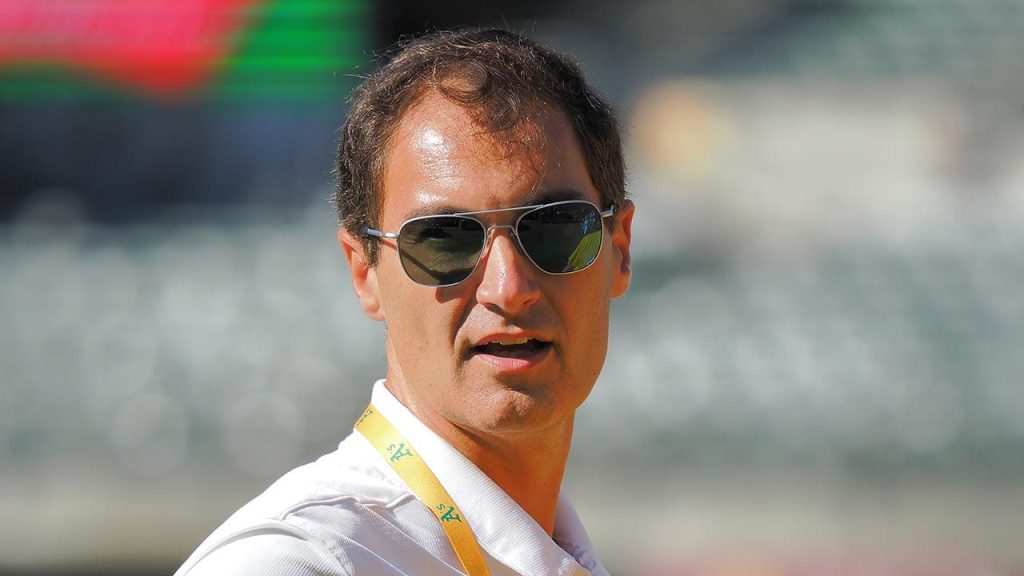Dave Kaval’s resignation as president of the Oakland Athletics marks a significant turning point in the franchise’s tumultuous journey towards relocation to Las Vegas. After eight years at the helm, Kaval, the public face of the controversial move, will step down on December 31, 2024, to pursue other business ventures in California. His departure comes just weeks after the team secured final approvals for the construction of a $1.75 billion stadium on the Las Vegas Strip, effectively sealing the A’s exit from Oakland after 57 years. Kaval’s tenure was largely defined by the protracted and ultimately unsuccessful effort to secure a new ballpark in downtown Oakland, followed by the contentious decision to relocate the team to Nevada. While the organization expressed gratitude for his leadership during a “period of significant transition,” his legacy will undoubtedly be intertwined with the bittersweet feelings of a fanbase left behind.
Kaval’s resignation underscores the complex and often emotionally charged nature of franchise relocation in professional sports. The pursuit of a new stadium, often driven by the desire for increased revenue streams and modern amenities, can pit team owners against local communities and loyal fan bases. In the case of the Athletics, Kaval’s efforts to secure a new home in Oakland were met with numerous obstacles, including political hurdles, community opposition, and financial challenges. The failure to reach a viable agreement in Oakland ultimately paved the way for the team’s relocation to Las Vegas, a move that has been met with mixed reactions from fans and observers alike. While some see the move as a necessary step for the franchise’s long-term viability, others lament the loss of a historic team from its longtime home.
The transition to Las Vegas represents a new chapter for the Athletics, one filled with both promise and uncertainty. The construction of a state-of-the-art stadium on the vibrant Las Vegas Strip offers the potential to attract new fans and generate significant revenue. However, the team will also face the challenge of building a loyal following in a new market, competing for attention with established entertainment options and other professional sports franchises. The interim period, during which the A’s will play their home games at a minor league ballpark in West Sacramento, California, will serve as a crucial bridge to the team’s eventual arrival in Las Vegas in 2028.
Sandy Dean, a longtime business partner of A’s owner John Fisher, will assume the role of interim president while the search for a permanent replacement begins in 2025. Dean’s appointment suggests a desire for continuity within the organization as it navigates this transitional phase. The selection of a new president will be a critical decision for the A’s, as they seek to establish a strong foundation in Las Vegas and build a winning culture both on and off the field. The new leader will be tasked with not only overseeing the completion of the new stadium but also cultivating relationships with the Las Vegas community and fostering a sense of connection with the team’s existing fanbase.
The A’s relocation to Las Vegas highlights the evolving landscape of professional sports, where franchise mobility has become increasingly common. The pursuit of new stadiums and larger markets has led to several teams relocating in recent years, often leaving behind disappointed fans and a sense of loss in their former cities. While the financial benefits of relocation can be substantial for team owners, the emotional toll on fans and the impact on local communities can be significant. The A’s move serves as a reminder of the complex interplay between business interests, community ties, and the passionate loyalty of sports fans.
As the Athletics embark on this new chapter in their history, the focus will shift from the controversies of the past to the opportunities that lie ahead. The construction of a new stadium in Las Vegas represents a fresh start for the franchise, a chance to build a new identity and cultivate a new generation of fans. The success of this transition will depend on the ability of the organization to embrace the challenges of a new market, forge strong connections with the Las Vegas community, and ultimately deliver a winning product on the field. The road ahead may be uncertain, but the potential for growth and success in Las Vegas is undeniable.

